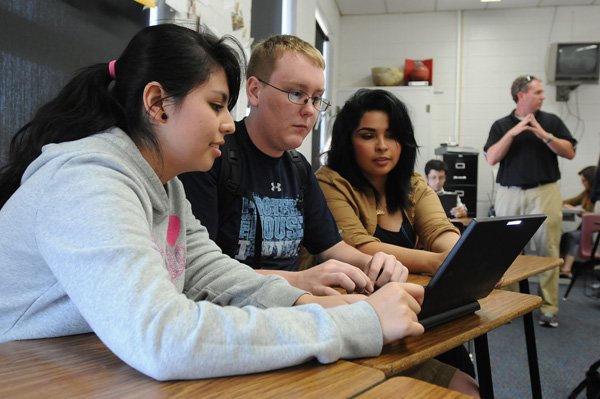Area students probably won’t be using digital textbooks in the next few years.
School districts submitted three-year technology plans to the Arkansas Department of Education in March. The plans fell short of including digital textbooks, but technology administrators were hopeful they could lighten students’ backpack loads.
Now administrators are sitting back and taking a more cautious approach.
“We don’t have any hard, fast plans to make changes on that anytime soon,” said Allison Byford, a technology director for Springdale School District.
“Fayetteville is waiting to see what companies produce,” said Sarah Robertson, chairwoman of the Fayetteville Public Schools Library Council.
Apple unveiled new iBooks software in January designed to make it easier to use digital school textbooks. The interactive software includes links and note-taking tools for students. The McGraw-Hill Co. is one of three publishers Apple tapped to release textbook titles through Apple’s iBooks.
By The Numbers
Technology Money
Area school districts plan to spend millions of dollars over the next three years to maintain technology and put more laptops and computer tablets in schools. The districts have not yet committed to digital textbooks.
School District Tech Budget
Bentonville $20 million
Fayetteville $10 million
Rogers $12 million
Springdale $25 million
Source: Staff Report
Will Maroni, a public relations associate with McGraw-Hill, said the company is increasingly collecting digital titles in anticipation of schools adapting the material on a mass level during the next several years.
“It’s an inevitable move,” said Andy Mayes, technology director for the Bentonville School District.
He said nearby school districts may not start using digital textbooks for at least four or five years.
Apple wants to cap the cost of a textbook at $15, far less than the few hundred dollars for many core-subject textbooks. The iBook software agreements would require districts to buy the same digital textbooks each year, which would eat into the savings Apple says the school districts would incur, Mayes said.
Springdale schools spent $424,000 on textbooks this school year. Although implementing electronic books could save money long-term, the initial hardware needed to use the books could be costly, Byford said.
Students already use computer tablets and laptop computers, but most are on mobile carts shared by classrooms. Any large-scale implementation of digital textbooks would require all students to have access to the devices needed to read the books, Byford said.
She said schools could cut costs by encouraging students to bring their own devices from home, but that option comes with its own obstacles. A 1996 Arkansas law forbids students from bringing electronic devices to school campuses.
Springdale administrators are crafting a counter-policy allowing students to bring smartphones, tablets and laptops to school grounds as long as the devices are used for educational purposes. Members of the district’s parent group applauded the effort, but some parents still questioned why administrators could not commit to widespread use of digital textbooks.
Chris Neyland has two children in Springdale schools. He said in a March parents meeting administrators should consider at least slowly phasing in digital textbooks, giving the option for some students to use traditional textbooks and others to use electronic books via their own devices.
Such a move could be ethically troublesome for school districts because administrators do not want to highlight students who do not have or cannot afford the technology, Mayes said.
Byford said administrators have similar concerns that to access all the information available on digital textbooks, all students would need to have Internet access at home. A high-poverty school district such as Springdale cannot safely assume all students have a home computer with Internet, she said. Two-thirds of Springdale students are eligible for free or reduced-price school meals, an indicator of poverty.
For all the talk of digital textbooks, Mayes said school districts’ ultimate goal should not be to keep up with the latest technology. School districts are constantly fighting a battle for students’ attention, and there are technological ways to do that without diving headfirst into electronic books, he said.
Scotty Person teaches world history at Springdale High School. Person uploads his lessons and notes online, allowing the students to view them at their convenience. The lack of note-taking in the classroom frees time for independent learning based on the subject.
Person often allows students to use a mobile cart of 15 mini-laptops for research and schoolwork during class time.
“It helps us learn faster,” said Gabbie Vega, a junior in one of Person’s classes.
Students understand the material instead of memorizing facts, Vega said.
Person may create an activity next year where students use Twitter while playing the role of a famous historical figure. Students would post messages as if they were living through important historical events, he said.
Person’s style of teaching uses technology to reach students constantly surrounded by social networking and electronic devices. Implementing digital textbooks could only enhance the school district’s classroom material, said Hannah Hodges, 17.

